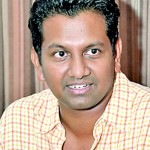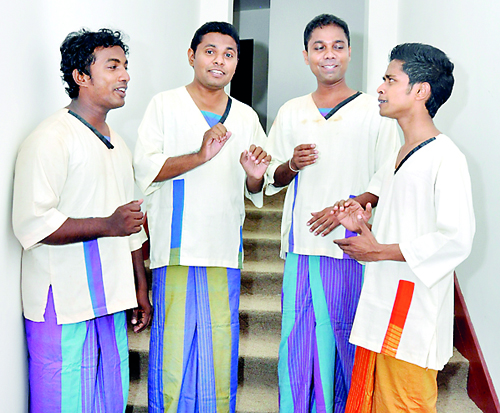It’s time for ‘Mei Avurudu Kaale’
The call of the Koha and sounds of Raban playing tells us that Avurudu is around the corner. During this Avurudu season, folk songs are commonly listened to and enjoyed by many Sri Lankans.
While both commercialised and traditional folk songs reach our ears, it is thanks to the efforts of musicians like Lionel Ranwala and his folk troupe ‘Lionel Jana Gee Kandayama’ that a new generation is still drawn to this music. His son, Sahan Ranwala presented ‘Yuddetath Awith’ as the first performance of ‘Ranwala Balakaya’, three years after his father’s passing and has since had various concerts such as ‘Gama Avlanynaan’, ‘Ahasei Innawalu’, ‘Three’ and ‘Mei Avurudu Kaale’.

Sahan Ranwala
Composer Pradeep Muthukudarachchi and choreographer Prasad Pulasinghe are students of Lionel Ranwala who now together with Sahan channel their expertise into the Ranwala Balakaya. The troupe performs on invitation only and also conducts workshops and lectures related to Sinhala folk songs. They were invited to perform at the Galle, Colombo and Jaffna Music Festivals and CHOGM in recognition of their work.
‘Mei Avurudu Kaale’ composed 16 years ago by Lionel Ranwala is the most requested song during Avurudu season. The Ranwala Balakaya are much in demand and perform a minimum of three shows a day during this season and a couple of shows per month, ‘Gama Avlanynaan’ being one of the most popular during the off season.
The troupe has toured countries like China, Cyprus, Australia, UK and the Middle East and won the award for the ‘Best Performing Folk Song Troupe’ at the Folk Songs Festival at Guangxi, China in 2011. Since then, they have received governmental support.
Their children’s folk song troupe comprising youngsters between the ages of 10-15, ‘Ranwala Lama Balakaya’ began in 2003. Classes are conducted in Ape Gama’ at the Jaathika Kalaa Kendraya in Battaramulla. The troupe’s most popular show is ‘Anaagathaye Kauda Wenne?’

Young musicians in harmony with their culture. Pic by Susantha Liyanawatte
Ranwala Balakaya’s main objective was to succeed nationally and now their aim is to gain international recognition. What makes this troupe special is that they are a challenge to those who say youth cannot produce good music. Many young people are eager to join them, says Pradeep.
In an era where our society is changing rapidly Sahan and his troupe work hard to preserve Sri Lankan culture and its traditions. We noticed something special within the troupe -when they greet each other, they bring their palms together and bow with respect in the traditional manner. How often do we see that today?


